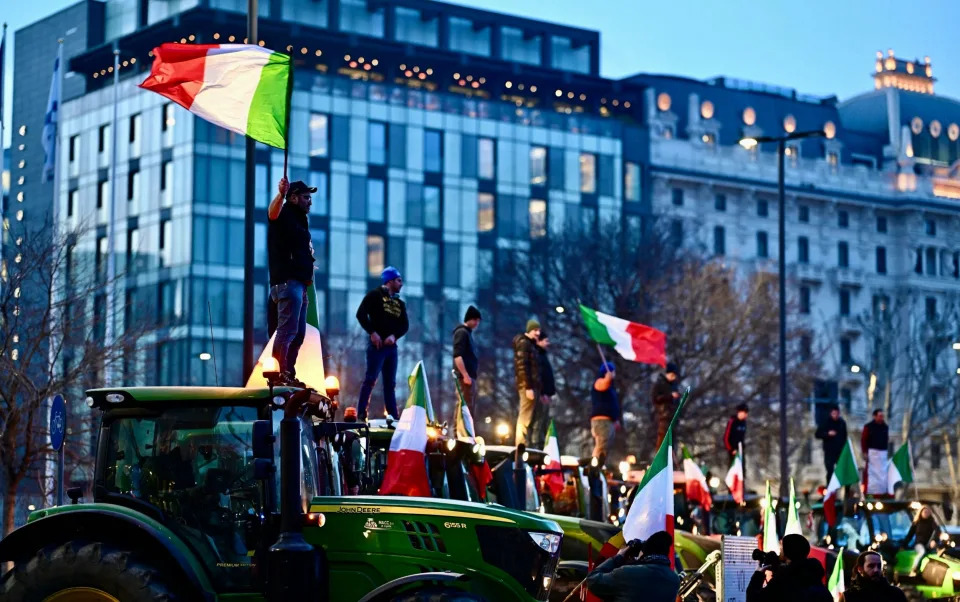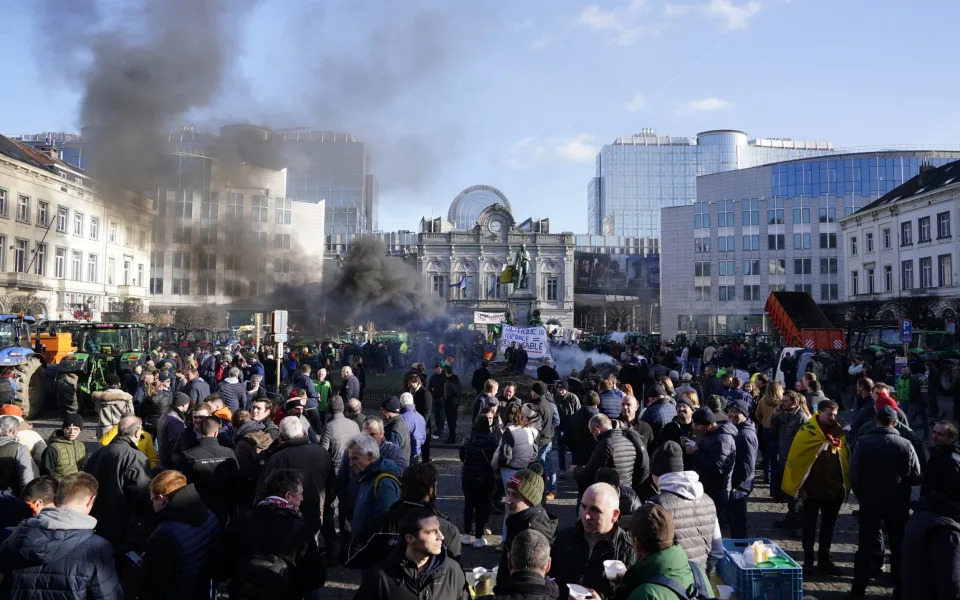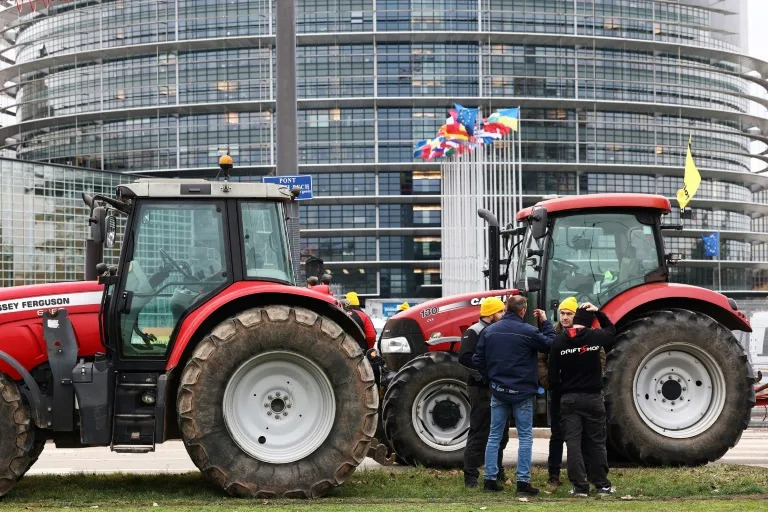James Crisp
Tue, 6 February 2024

The EU fears Eurosceptic parties could be bolstered by the farmers' populist revolt - GABRIEL BOUYS/AFP
Brussels’ climbdown on net zero rules for farmers will not stuff the Eurosceptic genie back into the bottle.
Polls predict anti-EU parties will win June’s European Parliament elections in nine member states – Austria, Belgium, the Czech Republic, France, Hungary, Italy, the Netherlands, Poland, and Slovakia.
Now fully emerged from their defensive crouch after Britain’s painful Brexit negotiations, they are set to come second or third in another nine EU countries.
The EU fears that those results could be boosted by the farmers’ populist revolt.
Tractor protests against climate rules handed a Dutch farmer’s party a landslide victory in regional elections last year after the vote became a referendum on establishment politics.

A farmer's tractor protest in Italy - IVAN ROMANO/GETTY IMAGES
After the ruling coalition collapsed, voters turned to Geert Wilders, an anti-migrant, Nexit-backing, farmer-supporting firebrand in November’s snap general election.
Copycat tractor protests have since been held in France, Italy, Germany, Belgium, Poland, and Romania, are expected soon in Slovakia and erupted in Spain on Tuesday.
Eurosceptic parties have adopted the farmer’s fight, robbing pro-EU forces of a constituency it has long regarded as its own thanks to the bloc’s huge agricultural subsidies.
A key battleground in the looming campaign is the pushback against the EU’s 2050 net zero target, a culture war given impetus by the cost of living crisis.

Geert Wilders, the farmer-supporting populist leader of the Dutch Party for Freedom - REMKO DE WAAL/SHUTTERSTOCK
Europe’s farmers are also anxious about competition with cheap agricultural imports from Ukraine after the EU waived trade restrictions and have thrown a spanner into the works of the bloc’s free trade negotiations with the Mercosur bloc of South American countries.
This is a problem for Ursula von der Leyen, the European Commission president who spearheaded the net zero push as one of her flagship policies.
Five years ago, her appointment to the European Parliament was approved by just nine votes after she relied on Green support to secure the job.
Now her own centre-Right European People’s Party, long the parliament’s biggest group, is courting the farmers by getting tough on environmental legislation.

Farmers are protesting against low pay, strict environmental regulations, and 'unfair' import levels - PIER MARCO TACCA/GETTY IMAGES
The Eurosceptic surge, like those before it, could be comfortably contained by an alliance of pro-EU parties, which will still be in the majority after the elections.
The European People’s Party simply has to forgo the temptation to form a conservative coalition with Eurosceptic parties to limit the influence of the likes of Marine Le Pen, Viktor Orban and Mr Wilders.
But Mrs von der Leyen has wilted under the pressure of her political family and shelved or weakened new EU green laws.
Agriculture is responsible for 11 per cent of all EU greenhouse gas emissions and 54 per cent of its polluting methane emissions.

Mrs von der Leyen’s latest U-turn is unlikely to stop the protests - JEAN-FRANCOIS BADIAS/AP
Removing farming from a plan to cut emissions by 90 per cent by 2040 is a massive concession to the sector, which represents just 1.5 per cent of EU GDP.
Services represent 64.7 per cent of EU GDP, while manufacturing is 23.8 per cent.
Allowing agriculture, which already benefits from a third of the EU’s budget – €386.7 billion over seven years – to force a more protectionist trade policy is equally astounding.
Mrs von der Leyen’s latest about-turn is a major sign of weakness and will not stop the tractor protests.
The farmers are holding the EU hostage and they are winning.
EU scraps pesticide proposals in another concession to protesting farmers
Agency reporter
Tue, 6 February 2024

Bulgarian farmers family hold posters reading: "We want humane treatment of farmers." "I want to be a farmer in Bulgaria" as they attend farmers protest with their a week old calf in front of Agriculture Ministry in Sofia, Monday,
The European Union’s executive arm has shelved an anti-pesticides proposal in yet another concession to farmers after weeks of protests blocked major capitals and economic lifelines across the 27-nation bloc.
Although the proposal had languished in EU institutions for the past two years, the move by European Commission president Ursula von der Leyen was the latest indication that the bloc is willing to sacrifice environmental priorities to keep the farming community on its side.
Farmers have insisted that measures such as the one on pesticides would only increase bureaucratic burdens and keep them behind laptops instead of farming, adding to the price gap between their products and cheap imports produced by foreign farmers without similar burdens.
Ms von der Leyen told the European Parliament in Strasbourg that the pesticides proposal “has become a symbol of polarisation”, adding: “To move forward, more dialogue and a different approach is needed.”

Darlington and Stockton Times: European Commission President Ursula von der Leyen delivers her speech at European Parliament in Strasbourg, eastern France, Tuesday, Feb. 6, 2024. The European Union's executive shelved its anti-pesticides proposal Tuesday in yet another concession
She acknowledged that the proposals had been made over the heads of farmers.
“Farmers need a worthwhile business case for nature-enhancing measures. Perhaps we have not made that case convincingly,” she said.
It is unclear when new proposals will be drafted. EU parliamentary elections are set for June, and the plight of farmers has become a focal point of campaigning, even pushing climate issues aside over the past few weeks.
Under its much-hyped European Green Deal, the EU has targeted a 50 per cent cut in the overall use of pesticides and other hazardous substances by 2030.

Darlington and Stockton Times: Farmers drive with their tractors on a freeway at the airport in Frankfurt, Germany, Saturday, Feb. 3, 2024. More than 2000 farmers drove around the airport to protest against the government's measure to scrap tax breaks on the diesel they use. (AP
The proposal was criticised both by environmentalists who claimed it would be insufficient to reach sustainability targets, and by agriculture groups who insisted it would be unworkable and drive farmers out of business.
The decision to shelve the proposal on pesticides represented the EU’s latest act of political self-retribution in reaction to protests that have affected the daily lives of tens of millions of EU citizens and cost businesses tens of millions of euros due to transportation delays.
Many politicians, especially on the right and its fringes, applauded the impact of the protests.
“Long live the farmers, whose tractors are forcing Europe to take back the nonsense imposed by multinationals and the left,” said Italy’s right-wing transport minister Matteo Salvini.

Darlington and Stockton Times: Protesting farmers with their tractors take part in a rally outside annual Agrotica trade fair in the port city of Thessaloniki, northern Greece, Saturday, Feb. 3, 2024. Greek farmers – hit by rising costs and crop damage caused by recent floods
Last week, Ms von der Leyen announced plans to shield farmers from cheaper products exported from wartime Ukraine and to allow farmers to use some land they had been required to keep fallow for environmental reasons.
In France, where the protests gained critical mass, the government promised more than 400 million euros in additional financial support.
Meanwhile, protests continued in many EU nations.
Since early Tuesday morning, farmers across Spain have staged tractor protests, blocking roads and causing traffic jams to demand changes in EU policies and funds and measures to combat production cost increases.
The protests came as the Agriculture Ministry announced some 270 million euros in aid to 140,000 farmers to address drought conditions and problems caused by Russia’s war against Ukraine.
On Monday night, farmers in the Netherlands blocked several roads and motorways with their tractors and set fire to bales and tyres.
In recent weeks, farmers have also protested in Poland, Greece, Ireland, Germany and Lithuania.
EU eyes 90% cut to greenhouse gases by 2040
Marc BURLEIGH
Tue, 6 February 2024

The latest EU climate announcements came as dozens of farmers protested outside the European Parliament building in Strasbourg (FREDERICK FLORIN)
The EU on Tuesday urged a 90-percent cut to its greenhouse gas emissions by 2040, even as the bloc's transition to a greener future was clouded by a widespread farmers' revolt.
"Based on the best available science, and a detailed impact assessment, we are recommending that the 2040 target should be a 90 percent emission cut" compared to 1990 levels, said the EU climate commissioner, Wopke Hoekstra.
He called for a "fair transition" that will still allow EU businesses to thrive and ensure "nobody is left behind" as the bloc seeks to become carbon-neutral by 2050.
In a sign of how politically fraught the environmental issue has become, with farmers venting their anger around the bloc, European Commission chief Ursula von der Leyen earlier Tuesday gave key ground by burying a plan to halve chemical pesticide use by the end of this decade.
The proposal "has become a symbol of polarisation", she acknowledged, with the legislation stalled amid divisions between EU lawmakers and member countries.
Tuesday's announcements came as dozens of farmers protested outside the European Parliament building, angry over shrinking incomes, rising costs and what they say are increasingly onerous green regulations.
The 27-nation European Union is already working towards an interim target of cutting greenhouse gas emissions by 55 percent by 2030.
But rising discontent could deal it a tougher time in trying to get the 2040 goal of 90 percent cuts adopted.
Far-right and anti-establishment parties have latched onto the farmers' movement and are predicted to make big gains in June elections to choose the members of the next EU assembly.
That vote will also lead to a new commission late this year. Von der Leyen has not yet said whether she intends to seek a new mandate at its helm.
- Backlash -
There is a vocal backlash from some industries to the bloc's climate policies and several national leaders are now calling for a "pause" in new environmental rules.
Eleven EU countries, including France, Germany and Spain had sent a joint letter to Brussels saying that the transition for an "ambitious" 2040 target needs to be "fair and just" and "leave no-one behind, especially the most vulnerable citizens".
The recommended target given Tuesday was accompanied by new post-2030 climate projections the commission was required to produce in the wake of the COP28 UN climate negotiations that took place in December.
The next European Commission will be tasked with turning the outline into proposed legislation ahead of next year's international climate summit (COP30).
The bloc's 2040 targets are expected to rely in part on the capture and storage of ambitious volumes of carbon dioxide -- incensing climate campaigners who criticise the technologies as untested and want to see gross emissions-cut pledges instead.
Even so, the plan would require a sizeable effort from every sector of the economy -- from power generation to farming, which accounts for 11 percent of EU greenhouse gas emissions.
- 'Very ambitious' -
Some of the strongest resistance to tougher environmental action comes from the centre-right European People's Party (EPP), from which von der Leyen hails.
The EPP's Peter Liese says a more cautious stance is justified.
As the bloc has been implementing its existing 2030 target, he said, "we see more and more how ambitious it is".
Liese considered a 90-percent emissions cut to be a "very ambitious" target for 2040 and stressed the need for "the right conditions, the right policy framework".
Elisa Giannelli, of the E3G climate advocacy group, urged the EU to keep the social impact of its climate policies front of mind.
"Getting this wrong," she said, "would allow conservative and populist voices to set the direction of the next steps."
The United Nations climate change organisation said in November the world was not acting with sufficient urgency to curb greenhouse gas emissions and thus limit global warming to 1.5 degrees Celsius above pre-industrial emissions.
With temperatures soaring and 2023 expected to be recorded as the warmest year in human history, scientists say the pressure on world leaders to curb planet-heating greenhouse gas pollution has never been more urgent.
rmb-jug/ec/yad
Marc BURLEIGH
Tue, 6 February 2024

The latest EU climate announcements came as dozens of farmers protested outside the European Parliament building in Strasbourg (FREDERICK FLORIN)
The EU on Tuesday urged a 90-percent cut to its greenhouse gas emissions by 2040, even as the bloc's transition to a greener future was clouded by a widespread farmers' revolt.
"Based on the best available science, and a detailed impact assessment, we are recommending that the 2040 target should be a 90 percent emission cut" compared to 1990 levels, said the EU climate commissioner, Wopke Hoekstra.
He called for a "fair transition" that will still allow EU businesses to thrive and ensure "nobody is left behind" as the bloc seeks to become carbon-neutral by 2050.
In a sign of how politically fraught the environmental issue has become, with farmers venting their anger around the bloc, European Commission chief Ursula von der Leyen earlier Tuesday gave key ground by burying a plan to halve chemical pesticide use by the end of this decade.
The proposal "has become a symbol of polarisation", she acknowledged, with the legislation stalled amid divisions between EU lawmakers and member countries.
Tuesday's announcements came as dozens of farmers protested outside the European Parliament building, angry over shrinking incomes, rising costs and what they say are increasingly onerous green regulations.
The 27-nation European Union is already working towards an interim target of cutting greenhouse gas emissions by 55 percent by 2030.
But rising discontent could deal it a tougher time in trying to get the 2040 goal of 90 percent cuts adopted.
Far-right and anti-establishment parties have latched onto the farmers' movement and are predicted to make big gains in June elections to choose the members of the next EU assembly.
That vote will also lead to a new commission late this year. Von der Leyen has not yet said whether she intends to seek a new mandate at its helm.
- Backlash -
There is a vocal backlash from some industries to the bloc's climate policies and several national leaders are now calling for a "pause" in new environmental rules.
Eleven EU countries, including France, Germany and Spain had sent a joint letter to Brussels saying that the transition for an "ambitious" 2040 target needs to be "fair and just" and "leave no-one behind, especially the most vulnerable citizens".
The recommended target given Tuesday was accompanied by new post-2030 climate projections the commission was required to produce in the wake of the COP28 UN climate negotiations that took place in December.
The next European Commission will be tasked with turning the outline into proposed legislation ahead of next year's international climate summit (COP30).
The bloc's 2040 targets are expected to rely in part on the capture and storage of ambitious volumes of carbon dioxide -- incensing climate campaigners who criticise the technologies as untested and want to see gross emissions-cut pledges instead.
Even so, the plan would require a sizeable effort from every sector of the economy -- from power generation to farming, which accounts for 11 percent of EU greenhouse gas emissions.
- 'Very ambitious' -
Some of the strongest resistance to tougher environmental action comes from the centre-right European People's Party (EPP), from which von der Leyen hails.
The EPP's Peter Liese says a more cautious stance is justified.
As the bloc has been implementing its existing 2030 target, he said, "we see more and more how ambitious it is".
Liese considered a 90-percent emissions cut to be a "very ambitious" target for 2040 and stressed the need for "the right conditions, the right policy framework".
Elisa Giannelli, of the E3G climate advocacy group, urged the EU to keep the social impact of its climate policies front of mind.
"Getting this wrong," she said, "would allow conservative and populist voices to set the direction of the next steps."
The United Nations climate change organisation said in November the world was not acting with sufficient urgency to curb greenhouse gas emissions and thus limit global warming to 1.5 degrees Celsius above pre-industrial emissions.
With temperatures soaring and 2023 expected to be recorded as the warmest year in human history, scientists say the pressure on world leaders to curb planet-heating greenhouse gas pollution has never been more urgent.
rmb-jug/ec/yad
No comments:
Post a Comment